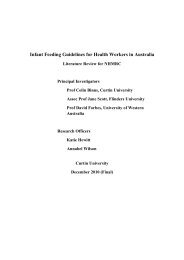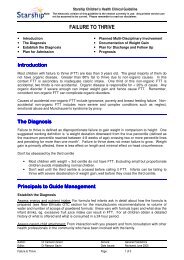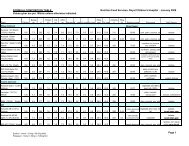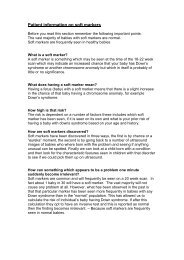ABDOMINAL PAIN, CHRONIC - Flourish Paediatrics
ABDOMINAL PAIN, CHRONIC - Flourish Paediatrics
ABDOMINAL PAIN, CHRONIC - Flourish Paediatrics
You also want an ePaper? Increase the reach of your titles
YUMPU automatically turns print PDFs into web optimized ePapers that Google loves.
InvestigationsStarship Children’s Health Clinical GuidelineNote: The electronic version of this guideline is the version currently in use. Any printed version cannot be assumed to be current. Please remember to read our disclaimer.<strong>ABDOMINAL</strong> <strong>PAIN</strong>, <strong>CHRONIC</strong>These follow logically from the history and examination and can be divided into screeninginvestigations and those that are used to confirm or exclude specific diagnoses (Table1).A full blood count and ESR (or c-reactive protein) should always be performed. Faeces should betested for occult blood and examined for the presence of red or white cells, bacteria and parasites.A normal urinalysis helps exclude atypical presentations of urinary tract infections. An abdominal x-ray may help confirm the clinical impression of constipation by demonstrating faecal loading.The presence of anaemia, thrombocytosis, iron deficiency, elevated ESR or C-reactive protein andreduced serum albumin, may all indicate chronic inflammatory bowel disease.An ultrasound is useful in excluding suspected gallbladder, renal or pelvic (ovarian cysts) diseasebut has a very low yield when used indiscriminately in all children with chronic abdominal pain.Endoscopy is the investigation of choice to confirm or exclude peptic ulcer disease, antral gastritisor oesophagitis. Biopsies may show evidence of H. pylori infection.Colonoscopy is indicated if chronic inflammatory bowel disease is suspected. Biopsies will helpclinch the diagnosis. Barium contrast studies are helpful in defining the extent of the disease.Table 1: Investigations In Children With Chronic Abdominal Pain:Screening:Full blood countESR (or C-reactive protein)Stool examination (including occult blood)UrinalysisIn selected cases:Abdominal X-rayAbdominal ultrasoundEndoscopy (and biopsy)Barium contrast studiesManagementSuccessful management is dependant on an accurate diagnosis.Not surprisingly the greatest difficulty is encountered with the non-specific recurrent abdominalpain syndrome. There is no place for rigid guidelines and one depends on clinical judgement indeciding on the most effective approach, which is based on thorough clinical assessment.One of the most important aspects of management is parental reassurance. Fears of specificunderlying diseases need to be confidently allayed. Parents need to know that this is a commonwell-recognised but poorly understood condition. A diary kept by the child with parental assistanceis an easy way to confirm the frequency, duration and associations of the pain.Author: Dr Ralph Pinnock Service: General <strong>Paediatrics</strong>Editor: Dr Raewyn Gavin Date Reviewed: August 2008Abdominal Pain, Recurrent in Childhood Page: 4 of 7









